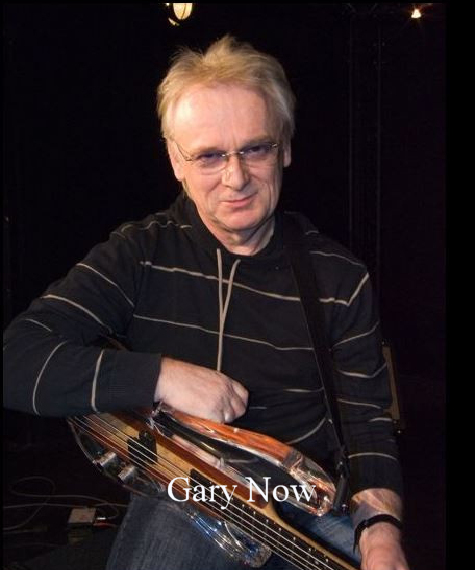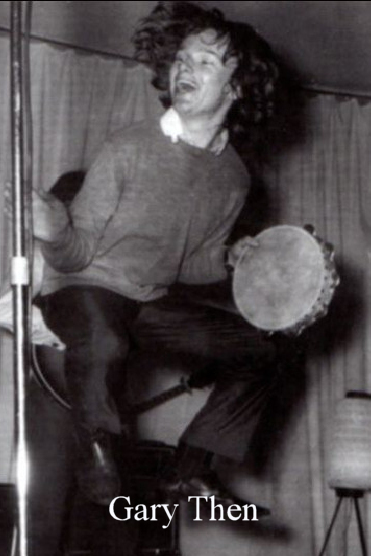The Shamrocks
Chapter 3 (1967)
by Gary Cowtan
This is the third of Gary's articles about the Isle of Wight band who, as a result of a national tv appearance, went to Germany.
In the 60s, one of the major differences between playing clubs/pubs in the UK and on the continent was that, on the continent, alcohol could be sold at any time of day or night, so musicians couldn't just play two sets and then go home, or, in the case of professionals away from home, go back to their hotels. It could mean anything from four to six 45-minute sets, with 15-minute breaks in between, which is a real strain on the voice and lungs for singers and, for instrumentalists, on the hands, plus arms, legs and feet for drummers. For players of wind instruments, it's a strain on the lungs, hands, arms and lips. It's also one reason why, after less than a year in Germany, the Shamrocks came back to Shanklin pier sounding more like a professional band! The other reason was that we were playing 6-7 nights a week most of the time! Many of the engagements were for a whole month (a few, for a half-month), sometimes with no days off. When the band became more well-known after the release of our album and first single, we were playing fewer and fewer of these and more and more one-nighters. These also often meant playing 4-6 sets and had the additional stress of travelling nearly every day.
It was after months of singing, playing, travelling, irregular eating and sleeping, without more than a couple of days off here and there that I collapsed on July 9th 1967 on the stairs of a hotel in Meinerzhagen, east-north-east of Cologne. Bern Roberts then drove me to a doctor, who diagnosed nervous exhaustion and ordered me to take 6 weeks off.
A tour of Austria was scheduled to start soon, so, for this, it was agreed that Dave Allen (keys/vocals) would take over on lead vocals, as he had already done a few times before, whenever I had worn out my voice from weeks of singing most of the songs every night. We were both baritones, so he could sing my usual songs in the same keys and also had a few that he always sang himself. Dave Eaglen volunteered to take over on bass. This was not new to him, either, as he always played bass in the songs in which I played harmonica. (This was the case in our "Ready, Steady, Win" TV appearance.) My absence meant that the band would be reduced to a four-piece, with one guitar instead of two.
Off they went to Austria: Bern Roberts, Dave Allen, Dave Eaglen and Pete Channing, while I travelled back to the I.o.W. to recuperate. Fortunately, it was summer, so, when I began to recover, I spent some of my time walking or cycling on my brother's racing bike (I was the first Vectis Roads C.C. schoolboy time-trial champion in 1959), to regain some strength. After a week or two, I received a letter from Dave Eaglen, my best friend in the Shamrocks. He wrote that the rest of the band didn't want me to come back and that there was nothing he could do about it. Bern Roberts relished the thought of earning more money without me, Pete Channing always did what Bern wanted and Dave Allen had always wanted to be the lead singer, which he now was!
In late August, I returned to Berlin, which had become the Shamrocks' base in Germany. All of us had girlfriends there, including me. My girlfriend had informed me beforehand that the Shamrocks would be in town at the time, playing for a month at Rolf Eden's Playboy Club. I went to see them there once and that was the last time I saw and heard the band. They were on the verge of splitting up by this time. If my memory serves me right, it was September 1967 when Bern Roberts left. Another British band called the Sing-Sing was in town, working for Rolf Eden and also about to fold, but the band still had contracts to honour in the Middle East and needed to keep a working unit together at all costs! I think it was the lead singer and the guitarist who both joined forces with the remainder of the Shamrocks: Dave Allen (keys), Dave Eaglen (now on bass) and Pete Channing (drums) and off they all went to the Middle East.
Life after the Shamrocks...
Bern Roberts wanted to get married and remain in Berlin, so he got a job from our old friend Rolf Eden as a disc jockey in his huge, newly-opened disco, the "Big Eden". Years later, when his marriage ended in divorce, he returned to the I.o.W. and worked as a waiter in Shanklin. He died in 2004 in Ventnor.Dave Allen, after years of touring Turkey, Iran, Israel, and a brief trip to the USA with The Sing-Sing Five, as they were now known, returned alone to Berlin and married his German girlfriend. He became a sound engineer for one of the famous Hansa Studios, where David Bowie, Siouxie and the Banshees, Alphaville, Andrew Lloyd Webber, Bon Jovi, Boney M., Cat Stevens (Yusuf), Depeche Mode, Tony Christie, U2, The Shamrocks and Wednesday, to name just a few, all recorded. After retiring, he died of leukaemia around 2015 in Berlin.
Dave Eaglen, also after years of touring Turkey, Iran, Israel, and a brief trip to the USA with The Sing-Sing Five, left the band and lived in St. Hellier, Jersey for some years, working in the office of a building company to the best of my knowledge, before retiring and returning to the I.o.W. He died of a brain tumour at a hospice in Shanklin Old Village.
Pete Channing, also after years of touring Turkey, Iran, Israel, and a brief trip to the USA with The Sing-Sing Five, settled and married in Tel Aviv, Israel and opened a pub there. He visited Dave Allen in the early 2000s in Berlin, whereupon Dave arranged a pub meeting for all three of us, as I live in a different part of town and Berlin is big. Pete later died around 2010 in Tel Aviv, I believe, of a liver-related disease.


Editor's Footnote
Gary still lives in Berlin as a successful session guitarist and song writer/producer.After the Shamrocks joined The Trans Europa Express and then formed Wednesday. Gary's song writing talents have brought him success all over Europe with number one hits for Charles D. Lewis (Soca Dance) and David Hasslehoff. David's hit "Looking for Freedom" was famously played as the Berlin Wall fell.
In 1985 Gary wrote "The Man Who Would Be King" with Island's Mike Jolliffe. Destined to be a Eurovison entry, it fell foul of legal problems. You can watch it HERE
Gary is currently working on Helene Fischer's latest album. Helene Fischer is Germany's most successful solo artist (and richest woman!). . There are lots of videos from her TV shows on YouTube, including one with Queen!


